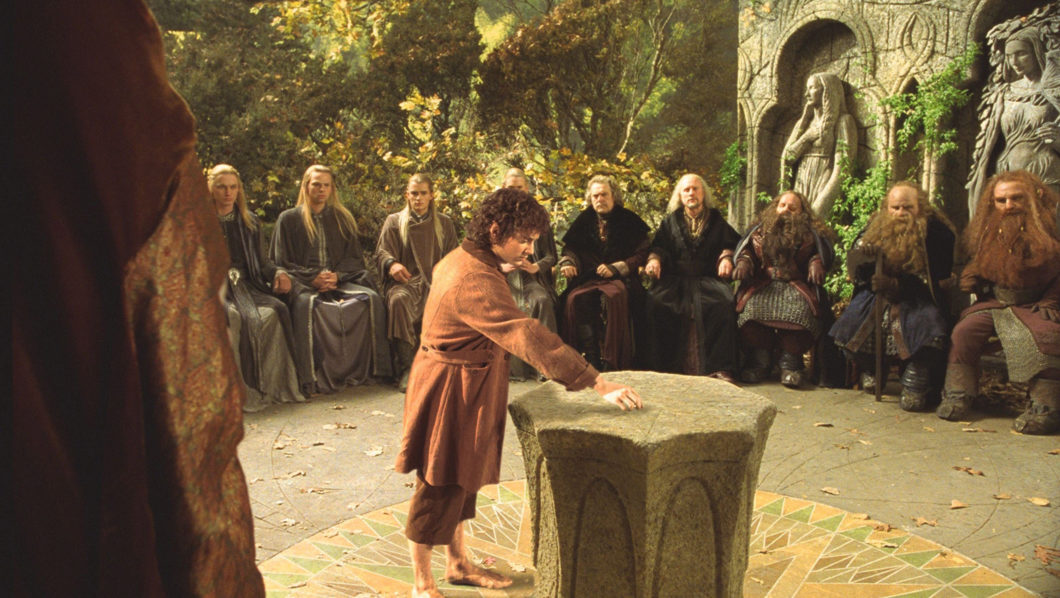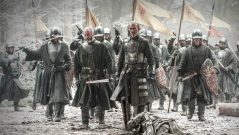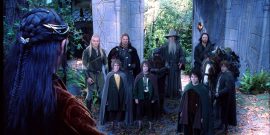J.R.R. Tolkien and the Necessity of Hope
The myth of “Pandora’s Box” has varied over time. Today it usually means inviting trouble by opening up something best left alone. In one version, what escapes Pandora’s Box (or “jar”) are different expressions of evil to afflict the world. In another version, it is the gods’ gifts to men that are lost. In all of those accounts, however, one item remains in Pandora’s Box: Hope (ἐλπὶς, elpis).
Whether in an ethical, a theological or a political context, the meaning of hope is often ambiguous. Fortunately, J.R.R. Tolkien’s Lord of the Rings provides a useful commentary on hope in his mythic saga, as the author illustrates the concept through his characters. Indeed, references to hope are surprisingly prominent in Tolkien’s magnum opus, occurring almost five-hundred times throughout the story.
Two types of hope appear in LOTR: false hope and genuine hope. The danger of the former is recognized a number of times in the story. For example, pausing with Aragorn during the Battle of the Pelennor Fields, Éomer observes that “hope oft deceives.” After learning that Frodo and Sam have traveled alone by way of the treacherous pass of Cirith Ungol, a troubled Gandalf admits to Pippin, “There never was much hope . . . Just a fool’s hope, as I have been told.” The hope that beguiles and leads to despair is best represented by Denethor, the Steward of Gondor. After Faramir is carried back critically wounded from the attack on Osgiliath, Denethor bitterly complains, “The fool’s hope has failed. The Enemy has found it, and now his power waxes; he sees our very thoughts and all we do is ruinous.”
Yet, another kind of hope is indispensable in the quest to carry the One Ring to Mordor and destroy it where it was forged. For Tolkien, moreover, this hope is not unidimensional—it is a rich concept with several aspects.
First of all, hope is not optimism; indeed, optimism is hard to find in the novel. Optimism deals in probabilities: if the odds are sufficiently favorable, optimism is a reasonable attitude; but, in Tolkien’s saga, the odds are rarely, if ever, in the favor of those who oppose Sauron. But no matter, because, unlike optimism, hope may flourish when the odds are unfavorable, and sometimes the more desperate the odds, the more hope may abound. As Legolas explains, with reference to a Middle Earth proverb, “Oft hope is born, when all is forlorn.” Neither is optimism as stable as hope. Optimism may be here today but replaced by pessimism tomorrow. Hope is steadier, especially as it becomes habitual.
Aragon observes, “We come now to the very brink, where hope and despair are akin.” By this he means that the circumstances of the fellowship are so dire that it would be as reasonable to yield to despair as to embrace hope, perhaps more so. To be sure, all of Tolkien’s characters have a dark view of the challenges that lie ahead, but it is not a struggle that excludes hope, for to abandon hope is to accept despair.
Tolkien is at his most insightful in perceiving the relationship between hope and knowledge; to be sure, knowledge is one of the most intriguing elements in his myth. For example, Galadriel, the Lady of Lórien, explains the enigmatic and dangerous quality of what might be learned from the mysterious “Mirror of Galadriel” when she says “For it shows things that were, and things that are, and things that yet may be. But which it is that he sees, even the wisest cannot always tell.” When Samwise gazes into the mirror, what he learns so disheartens him that, except for the wise restraint of Galadriel, he might have impetuously abandoned the quest and rushed back to the Shire. Earlier, at the Council of Elrond, before the journey has even begun, the elf Erestor is despondent as he plaintively asks, “What strength have we for the finding of the Fire in which it was made? That is the path of despair. Of folly I would say, if the long wisdom of Elrond did not forbid me.”
In response, Gandalf explains that despair is only justified if the future is known: “Despair, or folly?” said Gandalf. “It is not despair, for despair is only for those who see the end beyond all doubt. We do not.” In other words, notwithstanding devices like Galadriel’s Mirror or the “Seeing Stones,” no one can know the outcome of a mission such as theirs beforehand. To yield to despair, though, assumes that the outcome is foreordained. Wisdom rather chooses hope, precisely because the future cannot be ascertained.
To be sure, it is the knowledge that Denethor gains from the Palantir, one of the Seven Seeing Stones, that draws him to despair, and he is thus overtaken by Sauron. The Palantir yields knowledge that is true enough but may be interpreted wrongly; interferences drawn from that knowledge may be misleading, and demoralizing. With a dramatic flourish, Denethor reveals the source of his knowledge—and his despair:
Then suddenly Denethor laughed. He stood up tall and proud again, and stepping swiftly back to the table he lifted from it the pillow on which his head had lain. Then coming to the doorway he drew aside the covering, and lo! He had between his hands a palantír.
Armed with his gnostic vision, he taunts Gandalf as he exclaims, “I have seen more than thou knowest, Grey Fool. For thy hope is but ignorance.” Denethor triumphantly concludes, “The West has failed.”
Gandalf does not discount the power of the Palantiri. After the death of Denethor, Gandalf gathers a small group and explains, “The Stones of Seeing do not lie, and not even the Lord of Barad-dur can make them do so. He can, maybe, by his will choose what things shall be seen by weaker minds, or cause them to mistake the meaning of what they see.”
Gandalf further explains the insidious power of the Palantir when he says of Denethor:
He was too great to be subdued to the will of the Dark Power, he saw nonetheless only those things which that Power had permitted him to see. The knowledge which he obtained was doubtless, often of service to him; yet the vision of the great might of Mordor that was shown to him fed the despair of his heart until it overthrew his mind.
There is something of a self-fulfilling prophecy at work here: Denethor’s deterministic posture “will make the Enemy’s victory certain indeed.” Denethor’s demeanor is dark with despair, but it is all the darker because of his arrogance, which proceeds from his certainty. Unexpectedly then, we learn that despair propagates when rooted in pride, while hope flourishes in an attitude of humility.
Hope is not so much about what will be; rather it is anchored in the ideals of the present and even the past. For Tolkien, hope is informed by the heritage of Middle Earth and by an understanding of what is good and honorable. Lord of the Rings presents a vision of hope, an unyielding conviction that something is right and moral, and therefore must be fought for regardless of the consequences. Legolas observes, “Follow what may, great deeds are not lessened in worth.” After the successful defense of Gondor, Gandalf says, “It is not our part to master all the tides of the world, but to do what is in us for the succor of those years wherein we are set, uprooting the evil in the fields that we know, so that those who live after may have clean earth to till.”
Furthermore, there is no “final hope”: utopian dreams are alien to hope. Gandalf explains that the struggle in which they are enmeshed will not end, but will reappear, though in different guises, when he says, “Hardly has our strength sufficed to beat off the first great assault. The next will be greater. This war then is without final hope. . . .” Glorfindel, a Rivendell elf and guide to Aragorn and the hobbits, reaffirms the paradoxical character of hope when he says, “We should seek a final end of this menace, even if we do not hope to make one.” Aragorn believes that “there are some things that it is better to begin than to refuse, even though the end may be dark.” Undertaking a task is done because it is just and right to do, though the outcome may be bleak. Hope is also rooted in the past. After Gandalf and Pippin arrive in Minas Tirith, Beregond, one of the men of Gondor, explains, “Hope and memory shall live still in some hidden valley where the grass is green.” Hope may thus be drawn from what has been, as a means of rightly anticipating what may be.
Finally, hope is a choice, an act of the will. Time and again, the members of the Fellowship of the Ring choose to continue what at times seems a hopeless endeavor. Similarly, a nurse working in the Covid-19 unit of a local hospital gave an interview recently in which she described the overwhelming difficulty of her work. She concluded with Maya Angelou’s observation that “Fear and hope cannot occupy the same space. So you invite one to stay. I think we’ve seen too much fear. So it is a choice. You have to choose. I would choose hope.”



